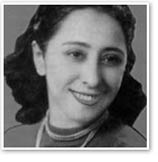 BAGHDAD, June 26 — Nazik al-Malaika, one of the Arab world’s most famous poets, an early exponent of the free verse movement in Arabic, died last Wednesday in Cairo. She was 83.
BAGHDAD, June 26 — Nazik al-Malaika, one of the Arab world’s most famous poets, an early exponent of the free verse movement in Arabic, died last Wednesday in Cairo. She was 83.
She had Parkinson’s disease for many years but died of unspecified natural causes related to old age, Nizar Marjan, the Iraqi consul in Cairo, told The Associated Press. In a country riven by sectarian strife, her life and work as a poet and a literary critic were poignant reminders of Iraq’s cultural renaissance in the mid-20th century. Baghdad was then considered the Paris of the Middle East, and poets and artists flocked here to work.
Ms. Malaika was one of a small group of Iraqi poets who broke away from classical Arab poetry, with its rigid metric and rhyme schemes. Influenced by the writing of Shakespeare, Byron and Shelley as well as by classical Arabic poets, these poets took up modern topics and used lyrical language that spoke with the immediacy of life on the Arab street.
In a searing poem about honor killings, “To Wash Disgrace,” in which a woman is killed by her father or brother for having dishonored the family by having a love affair before marriage, Ms. Malaika used simple language to convey the terrible loneliness of such a death.
Oh mother, a rattle, tears and darkness
Blood gushed out, and the stabbed body trembled.
“Oh mother!” Heard only by the executioner
Tomorrow the dawn will come and roses will wake up
Youth and enchanted hopes will ask for her
The meadows and the flowers will answer:
She left to wash the disgrace.
The brutal executioner returns
And meets people
“Disgrace!” He wipes his knife
“We’ve torn it apart.”
And returned virtuous with a white reputation.
She also wrote essays on the constraints imposed on women in Arab society and as an early feminist questioned the patriarchal structure that deprived many women of choices in marriage and career.
Born in Baghdad in 1923 to a mother who was also a poet and a father who was an editor and teacher of Arabic, Ms. Malaika was one of seven children. She wrote her first poems, in the classical Arabic form, when she was 10. She graduated from the Higher Teachers Training College in Baghdad, where she studied the classical Arabic poets and the modernists of the early 20th century, as well as learned to play the oud, an Arab lute, and attended classes in acting.
She learned English and French and won a scholarship to study at Princeton University. In 1954 she continued her studies at the University of Wisconsin, earning a master’s degree in comparative literature. She returned to Baghdad and married a fellow student in the Arabic language department, Abel Hadi Mahbouba, and with her husband and others helped found the University of Basra.
Later she moved to Kuwait, where she taught for many years, but like many Iraqis was forced to return to Iraq when Saddam Hussein invaded the country in 1990. Soon after the gulf war ended in 1991, she fled to Cairo.
Her husband, whom she described in an autobiographical essay as “the best colleague, companion and friend,” died in 2005. She is survived by a son.
In 1949, Ms. Malaika published her first volume of free-verse poetry, “Ashes and Shrapnel.” Earlier 20th-century Arab poets had already begun controversial experiments outside the rigid classical form, in which each verse ends with the same rhyme scheme and each line has the same number of beats. But it was her writing and that of a handful of contemporaries that popularized free verse, and she gradually became a celebrated figure and her poems the subject of academic studies.
Much of her work dealt with alienation and the fear of fading into oblivion. Her poem “Lament of a Worthless Woman” (1952) suggests the universal fear of being forgotten after death:
She left, no cheek turned pale, no lip trembled.
The doors did not hear the story of her death...
The news tumbled down the avenue its echo not finding a shelter
So it stayed forgotten in some hole, its depression the moon lamenting.
The New York Times